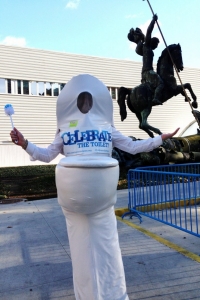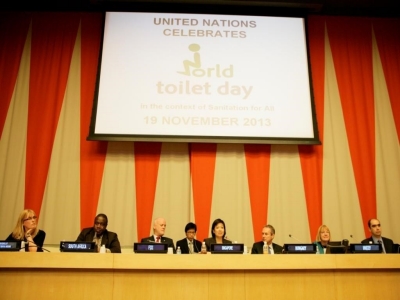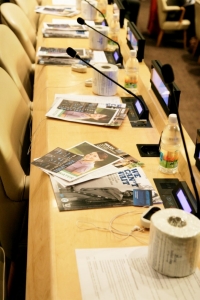MFA Press Statement: Commemorative Event to Celebrate United Nations World Toilet Day, 19 November 2013
-
20 November 2013
The Permanent Mission of the Republic of Singapore to the United Nations in New York organised a commemorative event on 19 November 2013 to celebrate World Toilet Day at the United Nations. This follo...
This article has been migrated from an earlier version of the site and may display formatting inconsistencies.

The Permanent Mission of the Republic of Singapore to the United Nations in New York organised a commemorative event on 19 November 2013 to celebrate World Toilet Day at the United Nations. This followed the unanimous adoption by 193 UN member states of a resolution initiated by Singapore on 24 July 2013 designating 19 November as UN World Toilet Day in the context of “Sanitation for All”. The programme of the seminar is at Annex A, and the statement given by Ambassador Karen Tan, the Permanent Representative of the Republic of Singapore to the United Nations in New York, at the commemorative event is at Annex B.

The commemorative event covered many different aspects of toilets and sanitation. Ambassador Tan summed up that “Toilets are no laughing matter. We need to break the taboo preventing a serious discussion of sanitation. UN World Toilet Day is aimed directly at this unhelpful taboo”.

Ambassador Tan also noted that there was a diversity of views and perspectives, including from governments, international organisations, practitioners and the private sector during the event. The common thread was the recognition of the urgency and importance of increasing access to improved sanitation. It is crucial that all stakeholders renew their commitment and efforts to achieve the Millennium Development Goal sanitation target. This requires working in close collaboration and strengthening global partnerships. It is also important to position sanitation as well as water and hygiene prominently in the UN’s discussions on the future Sustainable Development Goals (SDGs) and post-2015 development agenda. As the United Nations Secretary-General has said, there is a compelling moral and economic case for action on sanitation.
. . . . .
MINISTRY OF FOREIGN AFFAIRS
SINGAPORE
20 NOVEMBER 2013
ANNEX A
STATEMENT BY AMBASSADOR KAREN TAN, PERMANENT REPRESENTATIVE OF SINGAPORE TO THE UNITED NATIONS AT THE WORLD TOILET DAY SEMINAR ON 19 NOVEMBER 2013 AT 1500 HRS AT THE UNITED NATIONS, NEW YORK
H.E. Noel Sinclair, Deputy Chef de Cabinet of the President of the General Assembly,
Permanent Representatives,
Distinguished Guests,
Ladies and Gentlemen,
I thank you for being here at today’s seminar to celebrate World Toilet Day. It is the first time that the United Nations is officially observing World Toilet Day since the General Assembly passed the “Sanitation for All” resolution (A/RES/67/291) almost four months ago. I am glad that representatives from governments, the United Nations system, international organizations, civil society and the private sector have joined us for this event. Your presence underscores the importance the international community attaches to providing access to improved sanitation across the globe. It also reflects our shared interest in tangible and comprehensive efforts to tackle this pressing challenge.
2. Sobering statistics highlight the severity of the problem. 1/3 of the world’s population does not have access to improved sanitation. Of this 2.5 billion people, many come from poor and rural areas. Furthermore, as many as 1 billion people still defecate in the open, leading to unsanitary conditions that give rise to health problems and disease. For instance, inadequate sanitation is a major contributor to diarrhoeal disease that causes 760,000 preventable child deaths each year. It results in increased health care costs. Work and school productivity also suffer. Many of us have heard of the distressing experience of girls who do not go to school because of the lack of safe and proper sanitation. This is quite clearly no laughing matter.
3. Unfortunately increasing access to improved sanitation is still a work in progress. The WHO and UNICEF have warned that the Millennium Development Goal (MDG) target of providing basic sanitation is lagging behind other MDGs and is unlikely to be achieved before 2015. In other words, some half a billion people will be left out if the target of 75% global sanitation by 2015 is not met. It is therefore timely that we are gathered here at the UN to discuss and identify ways to ensure that the global agenda on sanitation stays on track. We cannot realistically expect to come up with all the answers in one afternoon. But we can give the issue the attention it deserves at the international, national and local levels. The United Nations Secretary-General’s Call to Action on Sanitation this year is a step in the same direction and I echo his message that sanitation is essential for sustainable development, dignity and opportunity.
Colleagues and friends,
4. Some of you may wonder why a small country such as Singapore chose to initiate and sponsor the “Sanitation for All” resolution. For a start, sanitation is something that countries both big and small need to deal with. Singapore’s land area is about 700 square kilometers, just slightly bigger than Manhattan. Nevertheless, extending sanitation services to Singaporeans took years of planning and commitment. When Singapore became independent in 1965, only 45% of the population had access to proper sanitation. It was only some three decades later that all Singaporeans had access to proper sanitation. This required the Singapore government to clean up rivers, relocate businesses and industries, resettle squatters and create new infrastructure. This did not come naturally to a fledging nation; discipline, creativity and investment in infrastructure were crucial parts of the overall jigsaw.
5. Singapore today continues to take steps to overcome natural constraints. About 40% of our water needs are served by importing water. To ensure an adequate supply of water, we rely on an integrated network of reservoirs, water desalination and water reclamation. Incidentally, you would have noticed the bottles of NEWater on the table in front of you. These are produced by advanced membrane technology that Singapore has used to purify used water to drinking standards. I am pleased to report that when United Nations Secretary-General Ban Ki-moon visited Singapore last year, he drank NEWater and called it the “elixir of life”. I invite you to drink this elixir too!
6. Our development experience, including with sanitation, is something that Singapore is happy to share with others. That is why we established the Singapore Cooperation Programme in 1992. Under this programme, some 80,000 officials from over 170 countries have received training in areas such as water management, sanitation and human resource development. To get a sense of what Singapore is doing in conjunction with World Toilet Day, I invite you to visit the displays that we have specially set up at the curved wall space on the first floor of the UN Conference Building. The exhibits by the Singapore Ministry of Environment and Water Resources and UNICEF show the Singapore sanitation story as well as the continuing global challenge of sanitation. I hope you will enjoy the exhibits and find them informative.
Colleagues and friends,
7. All stakeholders need to work together to ensure the MDG sanitation target is met. While governments have a primary role, international organizations, the private sector and civil society groups also have roles to play. In this regard, I am glad that Mr Jack Sim, founder of the World Toilet Organisation, is here with us today. The World Toilet Organisation has been instrumental in building an international network of toilet associations and organizations involved in sanitation. Over many years, Mr Sim has done much to raise awareness of this issue and is one of the main advocates of World Toilet Day. I am also pleased that Mr Sim and representatives from BRAC, iDE Cambodia, the Water Supply and Sanitation Collaboration Council, and WaterAid have agreed to share their experiences in the field with us. Their work with local communities is helping to change taboos around toilets and support the global sanitation agenda.
Colleagues and friends,
8. As some of you may know, this is not the first time that World Toilet Day is being commemorated. Many countries and civil society groups have done so of their own accord. However, this is the first time the UN is officially commemorating World Toilet Day. This reflects the international community’s recognition of the importance of improved sanitation for all. It is a call for all countries to approach sanitation in a broader context, including hygiene promotion, provision of sanitation services, sewerage and wastewater management and reuse of water in integrated water management. It signals the resolve of all stakeholders to accelerate efforts to achieve the MDG target of sanitation. As we work towards the sustainable development goals and the post-2015 development agenda, let us not forget the many who can lead better lives if only they had access to toilets and improved sanitation.
9. I thank you.
. . . . .
ANNEX B
PROGRAMME FOR COMMEMORATIVE EVENT FOR WORLD TOILET DAY IN THE CONTEXT OF SANITATION FOR ALL, 19 NOVEMBER 2013
Table caption
3.00pm | Opening Session Venue: ECOSOC Chamber, UN Conference Building, NY Chaired by: Ambassador Karen Tan, Permanent Representative of Singapore to the UN Opening statement by President of General Assembly as delivered by his Deputy Chef de Cabinet Ambassador Noel Sinclair Video message by Deputy Secretary-General Jan Eliasson Video message by HRH Prince El Hassan bin Talal of Jordan, Chair of the Secretary-General’s Advisory Board on Water and Sanitation “We Can’t Wait” video by Unilever Video message by Singapore Ministry of Environment and Water Resources and World Toilet Organisation (WTO) Address by Ambassador Karen Tan, Permanent Representative, Singapore |
|---|---|
3.30 pm | Special Segment - “The Challenge of Sanitation: Voices from the Field” Mr Jack Sim, Founder, World Toilet Organisation (WTO) Ms Tanzeeba Ambereen Huq, Programme Head, DECC/BRAC Bangladesh Mr Klann Mab, National Sales Manager (WASH Programmes), International Development Enterprises (iDE), Cambodia Ms Tanya Khan, Water Supply and Sanitation Collaboration Council (WSSCC) Coordinator for Pakistan Ms Alex Kent, International Campaigns Manager, WaterAid Q&A/Interactive Discussion |
4.30 pm | Panel Discussion: “Sanitation in the Post-2015 Development Agenda” Panellists: Presentation on “Water, sanitation and hygiene (WASH) as a Sustainable Development Goal/Post-2015 Development Agenda” by Ms Therese Dooley, Senior Adviser, UNICEF Ambassador Peter Thomson, Permanent Representative of Fiji, Chair of the Group of 77 and China Ambassador Csaba Korosi, Permanent Representative of Hungary, Steering Committee of Group of Friends on Water and Sanitation, Co-Chair of Open Working Group on Sustainable Development Goals Ambassador Jeremiah Nyamane Kingsley Mamabolo, Permanent Representative of South Africa Dr Val Curtis, Director of Hygiene Centre, London School of Hygiene and Tropical Medicine Mr Jean-Laurent Ingles, Senior Vice-President (Household Care), Unilever |
5.50 pm | Concluding Remarks by Ambassador Karen Tan, Permanent Representative, Singapore |
